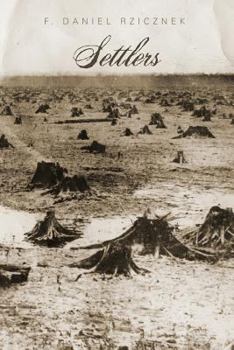Settlers
Transversing the territory between the pastoral and the elegiac, F. Daniel Rzicznek's Settlers inhabits the hidden, wild places of the American Midwestern landscape. The idea of "settling"--that a landscape can be tamed, that a human consciousness can fall back into immobility--is one these poems grapple with and resist, all the while charting the cathartic effects of the natural world on a collective imagination dually wounded by the madness of the post-industrial era and the multiplication of tragedy via media saturation. Within the "settled" landscape, it becomes clear that nothing, in fact, can be settled. Love, compassion, forgiveness, and transcendence all turn out to be moving targets and Settlers offers glimpse after glimpse of an unstable world in whirling, mesmerizing motion. Where the exterior landscape of weather, light and water skirts the interior wilderness of dream, vision, and prayer, these poems go out walking with their feet in the marsh and their hats in the infinite clouds, hoping to find what exactly it means to be human in a world imperiled by humans, and the all the fascinating and frustrating complexities contained therein.
What People Are Saying
"Reading F. Daniel Rzicznek's Settlers is like putting on a pair of X-ray goggles and suddenly seeing our surroundings--lake, snow, buttermilk, car, dog--in a radically different light. By telescoping multiple time scales onto the same place, whether an imagined world without humans, a past of Civil War soldiers, or today's acts of gun violence, these poems expand what is possible in landscape poetry and offer a deeply-felt ethical stance. "Every where is a ceaseless center--," Rzicznek writes, and so poetry, this splendid book tells us, must be a ceaseless act of inclusiveness." --Tung-Hui Hu
"Reading Settlers is a tactile experience, lush with precise knowledge of the abundance of the natural world. Rzicznek conjures up rural mysteries and the residue of disasters, creating a sense of d j vu, of things carefully noticed long ago and then forgotten, now resurrected in these poems. In "Houses, Drifting," "A man wrestles / a wheelbarrow from the river's fluid din," an image that suggests what relics lurk beneath surfaces in this collection--surprising, wondrous, and, in fact, unsettling." --Mary Quade
Related Subjects
Poetry




